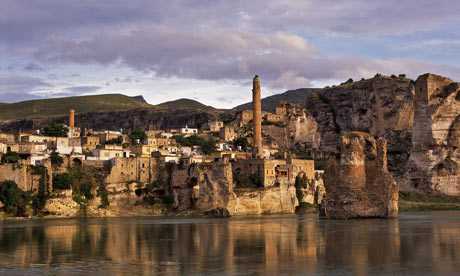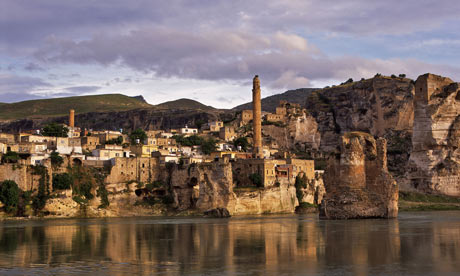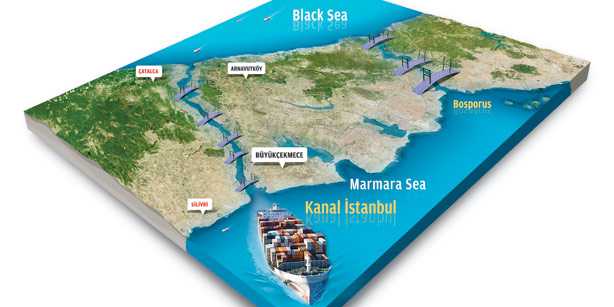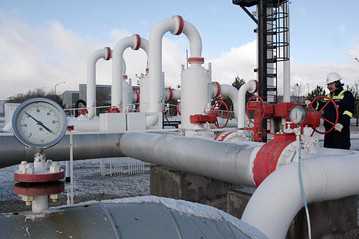Every springtime Pervin Çoban Savran takes her camels and sheep up into the Taurus mountains of southern Turkey, following the same routes along the Goksu river that Yoruk people like her have taken for more than 1,000 years. To many Turks these last nomadic tribes are symbols of the soul of their nation.
Their way of life – and that of millions of small farmers – is being threatened by Turkey’s Great Leap Forward, one of the most dramatic and potentially devastating rushes for economic development and prosperity Europe has seen in decades.
Thousands of dam and hydropower schemes are being built on almost all of the main rivers in a pharaonic push to make Turkey a world economic power by the centenary of the republic in 2023.
The ruling AK party, expected to win a record third term in next month’s elections, is forcing through a series of gigantic public works projects that include three nuclear power plants – despite Turkey being one of the most seismically active nations on earth.
The first plant, a prototype Russian reactor on the Mediterranean coast near the port of Mersin, is close to a highly active faultline. A second, Japanese-built, plant will soon follow on the Black Sea near the city of Sinop.
Prime minister Recep Tayyip Erdogan raised eyebrows across the world last month by promising to cut a 40-mile canal between the Black Sea and Marmara to relieve the dangerously overcrowded Bosphorus strait, an idea even he calls his “crazy plan”.
He has since topped that by revealing a blueprint for two new cities to relieve earthquake-prone Istanbul. Critics say they will only further extend Europe’s largest megalopolis, home already to nearly 17 million people.
It is Erdogan’s declaration that Turkey’s rivers must no longer “run in vain” and 100% of its hydroelectric potential be harnessed over the next 12 years that has environmentalists most worried. They claim that the rush for hydropower is likely to be even more damaging to Turkey’s delicate ecological balance, where desertification and depopulation are already problems.
Hundreds of private companies have been given extraordinary latitude to evict villagers, expropriate private land, clear state forests and steamroller normal planning restrictions to meet the target of 4,000 hydroelectric schemes by 2023. Protestors claim licences have been granted on highly favourable terms, guaranteeing investors four decades of clear profit.
The Turkish Water Assembly, an umbrella group researching the impact of the push for more power, argued that 2 million people could be displaced by the hydropower schemes alone. They accuse the government of riding roughshod over human rights, and Turkey’s commitments to preserving its extraordinary biodiversity and cultural heritage, in the name of energy security.
Campaigners fear Ankara is also determined to press ahead with the massive Ilisu dam project on the Tigris river, which was halted three years ago after an international outcry over the flooding of the ancient city of Hasankeyf.
The Ilisu dam is dwarfed by the $4bn Beyhan project on the Euphrates, also in the Kurdish south-east, where fears of the forced evacuation of the local population evokes bitter memories of the mass clearances of Kurdish villagers by the Turkish army during the war with the Kurdish separatist PKK in the 1980s.
Demonstrators intent on converging on Ankara from five corners of the country are still being prevented from reaching the capital after a week-long standoff with riot police outside Ankara. Many, like the Yoruks, had been walking for two months as a part of the Great March of Anatolia, a movement sparked by anger at the hydro plans but which has come to embody growing anxiety that the country is being despoiled in the rush for growth.
While the neo-liberal reforms of the moderately Islamist AK party have been credited with firing the country’s runaway growth, the gulf between the rich and poor has widened dramatically, and corruption has increased.
The Turkish government insists it must act radically to safeguard the decade-long boom, with growth this year predicted to top 7% despite the worldwide downturn.
Energy, however, is the achilles heel of the so-called Anatolian tiger, with industry heavily dependent on imported gas from Russia and Iran. Despite making itself the hub of a network of pipelines serving Europe from Russia, Central Asia and Iran, Turkey is even more at the mercy of Moscow and Tehran – a fact dramaticallydemonstrated four years ago when Iran turned off the tap and sent fuel prices in Istanbul soaring overnight.
Erdogan has so far been withering of critics of his Great Leap Forward, accusing them of holding Turkey back. He argued that the hydro projects will bring thousands of jobs to the underdeveloped east, irrigate barren land and reverse the wave of migration to the more prosperous west.
“All investments can have negative outcomes,” he said. “But you can’t give up just because there can be some negative outcomes. We cannot say that there will be no earthquake, but we will take all the precautions.”
After the Fukushima disaster in Japan, his energy minister Taner Yildiz caused consternation by claiming that nuclear power was no more dangerous than staying single, citing studies showing married people tend to live four years longer. Alcohol and smoking posed more danger than nuclear power, he claimed, prompting comparisons with former president Kenan Evren’s claim after Chernobyl that “radiation is good for the bones”.
Tourism minister Ertugrul Gunay appeared to break ranks, warning that “if the hydroelectric energy projects are carried out in a reckless manner, cutting out each brook, levelling each mountain and destroying forests just to be able to produce a few watts of energy, tourism would be an impossible dream”, particularly in the Black Sea region.
His comments came as laws were being drafted to allow nature reserves to be handed over for hydroelectric projects. Still more worrying to campaigners has been the official reaction to the legal morass the plans have created, with almost 100 lawsuits filed in the last two years. Of the 41 cases so far heard, judges have halted 39. Work has often continued in defiance of the courts with the protection of police and gendarmerie.
Each hydro scheme is allowed to take 90% of the water out of a section of river, leaving the remaining 10 % as “lifeline support”. After the water travels through the turbines, it is returned to the river, but farmers say much of the water is either lost, polluted or has had the “life taken out of it”.
For Yoruks such as Pervin Çoban Savran it is their very survival that is in question. “Nobody in parliament has shown any interest in our cause,” she said. “They don’t love life, only money. These dams are bringing about our end. Our culture is being destroyed.”
Hydroelectric projects on the tributaries of the Goksu river have already severelydamaged traditional pastures, she said. “It has affected us very quickly. But in the end, everyone else will suffer too.”
‘They want to turn us into slaves’
“They killed me when they took my land,” said Sinan Akçal, a tea grower from the spectacular Senoz valley on the Black Sea. He has watched his local court order the cancellation of the hydropower project his land was expropriated for no less than three times. But each time the Turkish environment ministry, which originally rubber-stamped the project without an environmental impact assessment, overrides the court ruling – and work on the dam continues.
In the meantime, large swaths of forest above the valley have been felled, triggering landslides and soil erosion.
“They’ve taken my land and they’ve offered me 15,000 lira [£5,800]. I didn’t take it, and I won’t take it,” said Akçal, 54. “They just want us to go to the cities and turn us into slaves. But what does 15,000 lira get you in a city? In a year the money will run out.
“Where I come from, people don’t have a lot of arable land, but we grow corn, potatoes, tea and vegetables and we have everything we need. I don’t need huge amounts more of electricity, it is not going to benefit us. My mother is 84, and she can’t live anywhere else.”
He added: “The talking is going nowhere. Again and again we went to court – again and again the courts sided with us. But they didn’t stop, they just kept on working, cutting trees, dirtying the water. In total we have counted 25,000 dead fish in our stream.”






